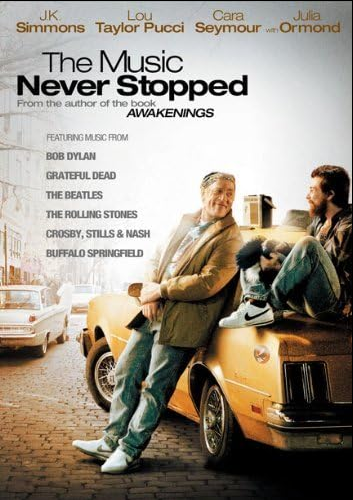CineTV Contest #82 - Favorite movie with illness : The music never stopped.
.png)
Films about medical dramas and illnesses can move us in the face of other people's pain, or on the contrary, they run the risk of generating rejection due to the viewers' unwillingness to watch a tragic story. However, another feeling that may arise is that of admiration for the courage and ability of the patient or his relatives to overcome.
Memory loss is a symptom of brain dysfunction, this disease is characterized by the fact that memories can be stored in short-term or long-term memory, depending on what is involved and how important they are to the person.
Source
Short-term memory and long-term memory are stored in different parts of the brain.
In this film, a middle-aged young man suddenly turns up in an accident after years of being estranged from his family. He has a brain tumor, undergoes surgery and loses his immediate memory, preserving memories from 20 years earlier.
His father, who played with him since he was a child to identify songs, is at first a man who embodies conservative values, as a result of which he wanted to impose his way of thinking and tastes on him.
A confrontation between these protagonists was the reason for Gabriel to leave the family when he was only a teenager, to end up as a vagabond with a tumor that, having been detected very late in its development, urgently needed to be removed, being his life at risk.
Source
This medical condition led Gabriel to be admitted to an institution for the care of patients with similar chronic conditions. Knowing his musical vocation, his parents hire a music therapist, who does an effective job of reconnecting him with the world.
The viewer can feel the changes in the protagonist's mood in a matter of seconds, listening to the first chords of that song that reminds us of our first kiss, our first failed love, our first drunkenness, the first concert of our life and an endless number of memories that are linked to that song.
Source
The Music Never Stopped is an emotional film about health and illness, which, through numerous songs, explores the values and affections of those who can only connect with the contemporary world from the past. It is also a good example of the use of music therapy.
Source
Good music is subjective, and no one is qualified to say that this or that song is not good as long as there is someone to whom it awakens a minimum of emotion. The director shows us that a desperate father is willing to change his beliefs for the love of his son and to recover the time lost with him.
This film amazes me because it conveys the idea that music is wonderful, magical and immortal. If there is a song that reminds you of someone, even if that someone is not physically next to you, you will always remember them when you listen to it. And if you close your eyes and let yourself go, you will be transported back to the moment when you heard it with that person.
We hear an excellent soundtrack with songs by Bob Dylan, Rolling Stones, Greatful Dead, Buffallo Sprinfield, Buddie Holly, Cream, and The Beatles, among others.
Source
The musicalization of the film is very good and makes the viewer empathize with the protagonists by presenting famous musical themes of the last 60 years.
I chose this film in principle because I suffered a similar mishap with my wife, thank God, not because of a tumor but because of a traffic accident that caused a brain contusion. In addition to the shock and all the medical expenses that this caused, she lost her short term memory and could not remember what she did or what she said in a short period of time, be it weeks, hours, minutes or seconds. It was terrible, but she would start telling me stories from over 20 years ago and sometimes she didn't even recognize me.
With a lot of medical care, dedication and mental exercise he managed to recover, he even liked to listen to old music and he would tell me precisely what he was doing or what he experienced at the time when this music was in fashion.
The director of this film is Jim Kohlberg and it stars J.K. Simmons (Henry Sawyer), Julia Ormond (Dianne Daley), Mia Maestro (Celia), Cara Seymour (Helen Sawyer) and Lou Taylor Pucci (Gabriel Sawyer). It is based on a story written by neurologist Oliver Sacks, author of the book Awakenings, which was brilliantly made into a film by Penny Marshall.
Additionally, the film caught my attention because I am a music lover and the soundtrack even features Bing Crosby!
A big greeting to the CineTv community, I hope you are encouraged to see this highly recommended film.
This is my participation in the CineTV Contest #82 - Favorite movie with illnessLink Here.
This is the source of the first image Source
Posted using CineTV